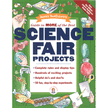Investigations for Science Fair Projects
What is a Science Fair?
What is a Science Fair Project?
A science fair is a competition where you, the contestant, enter your science projects.
How is a Science Fair Project Different from any other Science Project?
Every science project has rules to follow. What distinguishes one science project from another are the rules used in developing the project. Thus, even science fair projects can be different if the rules of the fair the projects are competing in are different. This is why, except for individual school fair, there are specific rules for regional, state, and national science fairs. These rules are published online. Know the rules of the fair you are entering and adhere to them as you design and develop your science project.
Rules and Guidelines for International Science and Engineering Fair
The two types of science project investigations most
commonly required for science fairs are:
Experimental
and
Comparison
Science Project Investigation: Experimental
Experimental Investigations involve manipulating one variable to see how it affects a second variable. YIKES!! While this may sound difficult, it really isn’t. Let me give you an example of an experimental investigation:
Purpose: To determine how air temperature affects plant growth?
Since a variable is something that changes, the two variables identified in the purpose are: air temperature and plant growth.
Which of the two variables would be manipulated, meaning that you would control how it is changed? This would be the air temperature around a plant.
Note: The manipulated variable is called the independent variable.
The remaining variable, plant growth, is what is being observed to determine if changes in air temperature affects its growth.
Note: The affected variable is called the dependent variable, which makes sense since changes in this variable (plant growth) depends on how you manipulate the air temperature (the independent variable).
FYI: When experimenting, you want to control as best as possible other things that might affect plant growth, such as light, humidity, type of soil, etc…
Science Investigation: Comparison
Comparison Investigations involve comparing a single property of two or more things that do not affect each other. For example:
Purpose: To determine how the magnetic strength of an electromagnet compares to the magnetic strength of a magnet.
What is the property being compared? Magnetic strength.
What are the sources of the magnetic strength? There are two types of magnets–an electromagnet and a magnet.
RETURN TO SCIENCE PROJECT TEACHING TIPS
If you don’t find what you need, ASK JANICE.
 |